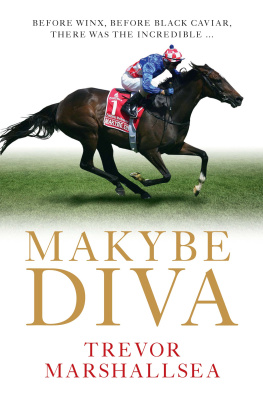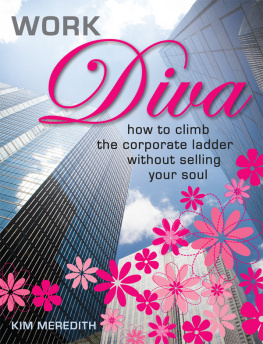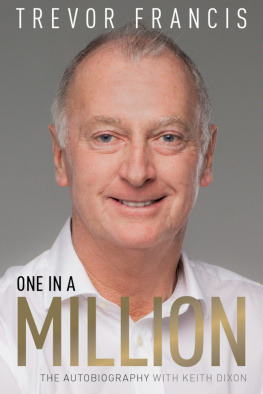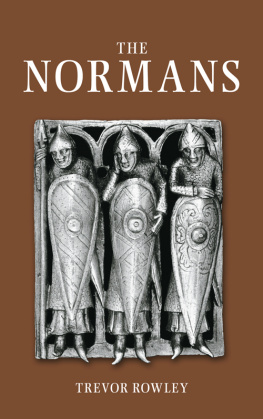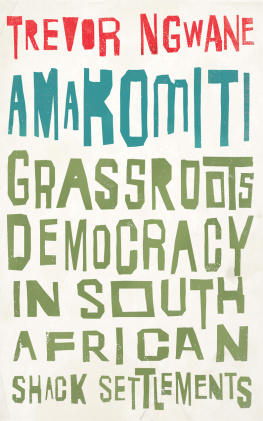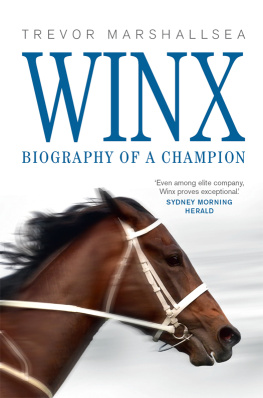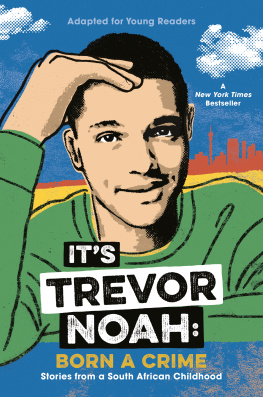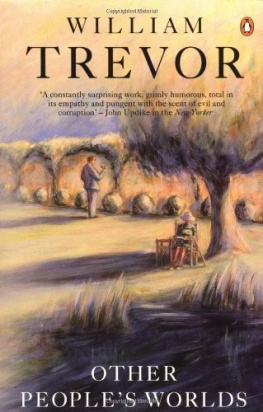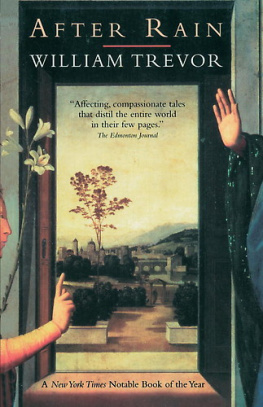Trevor Marshallsea - Makybe Diva
Here you can read online Trevor Marshallsea - Makybe Diva full text of the book (entire story) in english for free. Download pdf and epub, get meaning, cover and reviews about this ebook. year: 2019, publisher: ABC Books, genre: Non-fiction. Description of the work, (preface) as well as reviews are available. Best literature library LitArk.com created for fans of good reading and offers a wide selection of genres:
Romance novel
Science fiction
Adventure
Detective
Science
History
Home and family
Prose
Art
Politics
Computer
Non-fiction
Religion
Business
Children
Humor
Choose a favorite category and find really read worthwhile books. Enjoy immersion in the world of imagination, feel the emotions of the characters or learn something new for yourself, make an fascinating discovery.
- Book:Makybe Diva
- Author:
- Publisher:ABC Books
- Genre:
- Year:2019
- Rating:4 / 5
- Favourites:Add to favourites
- Your mark:
- 80
- 1
- 2
- 3
- 4
- 5
Makybe Diva: summary, description and annotation
We offer to read an annotation, description, summary or preface (depends on what the author of the book "Makybe Diva" wrote himself). If you haven't found the necessary information about the book — write in the comments, we will try to find it.
Makybe Diva — read online for free the complete book (whole text) full work
Below is the text of the book, divided by pages. System saving the place of the last page read, allows you to conveniently read the book "Makybe Diva" online for free, without having to search again every time where you left off. Put a bookmark, and you can go to the page where you finished reading at any time.
Font size:
Interval:
Bookmark:
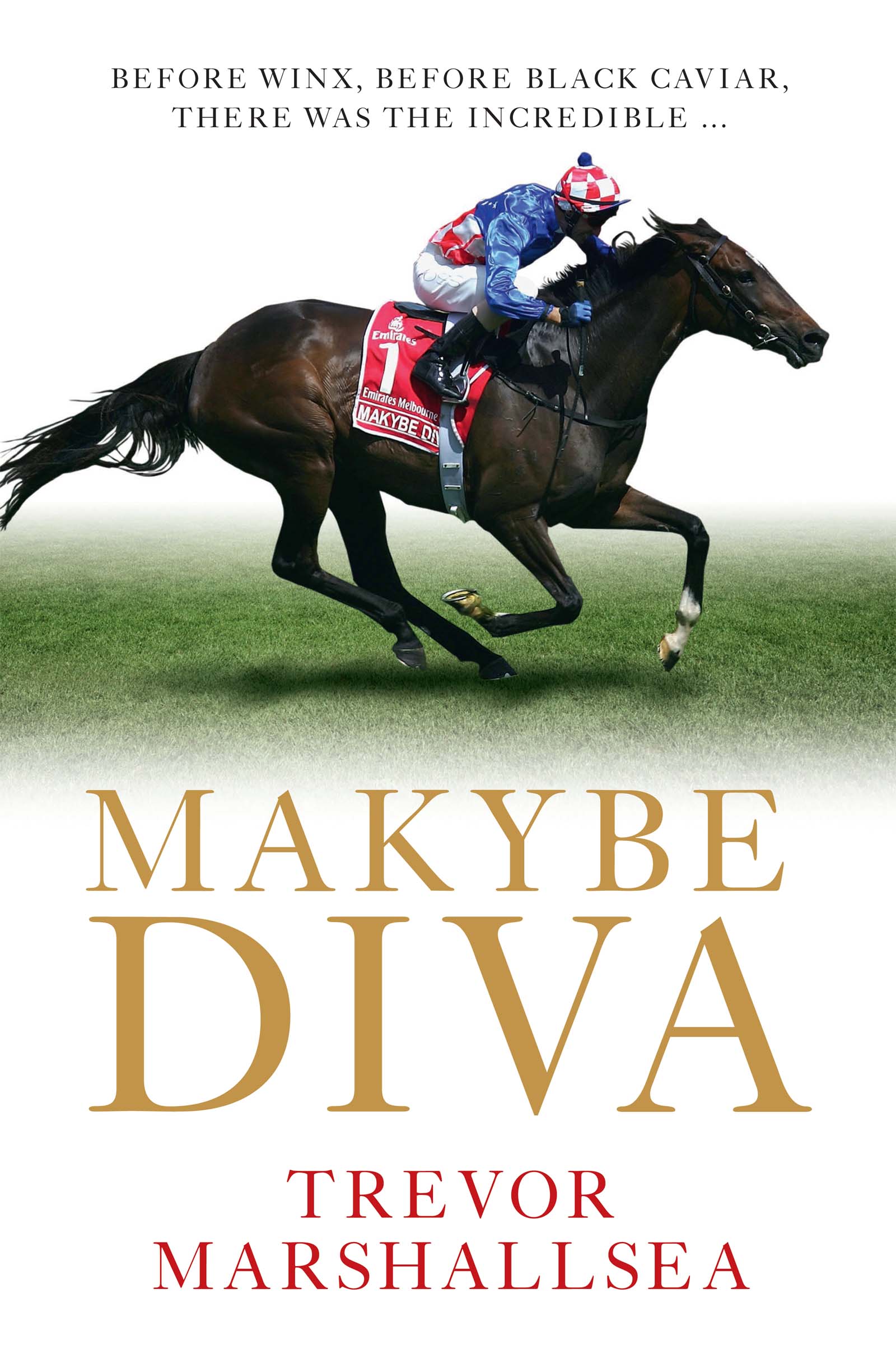

To a silent, unflinching hero who
made our spirits soar Makybe Diva
Contents
THREE AND A THIRD MINUTES...
A flash of time, a potent, charged fragment of a weekday afternoon, that makes this Tuesday the most famous Tuesday of all.
Anticipation had been building since dawn that day. Speculation had swirled for three tantalising months, and had reached a rare intensity for the past week. Hope had been alive for a year.
For a nation spawned by chance, reared on danger and possibility, on risking loss for gain, these few minutes say more about Australia than anything else. On the first Tuesday of each November, the country stops for a horse race, its horse race, and, without doubt, its strongest cultural institution the Melbourne Cup.
A phenomenon, it was born from a boom time, buoyed by the discovery of gold, and as it grew in prestige and annual intrigue, the Cup evolved to unify its country like nothing else can. To encapsulate its soul.
On this spring afternoon each year, a nation, 24 million people near enough, stops what its doing and turns their eyes to the same stage. Fly over any town, city or village at 3.00pm, look down, and you know how theyll be engaged.
The Cup is unique among the worlds major races, in that its a handicap. Weights are allocated according to ability, rather than age or gender, in hope of giving many runners a chance. Its a system which resonates with the founding spirit of Australia itself.
And the Cup is tough a gruelling, exhausting, two-mile long test of those taking part; one that demands months of preparation and where a split second indecision, the wrong call, calamity can unravel a carefully stitched plan, amid a litter of failed chances. Triumph is fiendishly hard to come by. Even once.
Myriad possibilities exist, the outcome maddeningly hard to predict. And still, each November a nation signs up for this annual unscripted mystery, a pillar thats been there, enduring and reassuring, since almost the start of its colonial age. And they do so in the knowledge that each version can please only the minority.
But this time, the millions were pulling the same way. Hearts beat with hope that the Cup, which had forged folk heroes for 144 years, would unfold as never before, in a way long dismissed as impossible, and with a burst of glory unlikely to be seen again. The millions were baying to witness history, the kind that lifts the spirit; to see the unforgettable triumph over its more common rival, anti-climax. Yet their hopes lay in a hero who had mountains to overcome: a sapping burden to carry, the crushing weight of history, a vast opposition, and the fates of a battle intense.
Reassuringly, at least, this was a rare kind of hero; a mare born, but unwanted, in Australias colonial motherland, England, whose story had captivated the country; a bay with a white star between her fierce eyes, a deep chest housing an undoubtedly massive heart, and with a strange, concocted, name which had grown not only familiar but loved Makybe Diva.
A late bloomer, the seven-year-old had already achieved the incredible, adding her name alongside some of the greats of the turf. Shed won more prizemoney than any other horse in Australasia. Shed set a time, for 2000 metres, which can still, many years later, lay claim to being counted as a world record. And in her latest performance shed inspired awe in winning one of the most astonishing versions of one of this countrys finest races, the Cox Plate.
Shed repeatedly conquered adversity. Only a few months before this, it appeared her career was over after an ill-fated mission to Japan. After her Cox Plate triumph, the people around her had again concluded a curtain should be lowered. But while her ability to defy odds was proven, this time her task lay somewhere between fairy tale and miracle. Makybe Diva, the only mare amid the five horses to have won two Melbourne Cups, would try to become the first horse to win Australias race three times.
The Divas tale is not only that of a phenomenal equine performer. Its a story of the centuries of thoroughbred breeding that went into making her, the happenstance that brought her to Australia, and the calm patience required early in her career, when the young, thin filly, bred to northern hemisphere time, took on southern-bred horses far more seasoned than her. Its about the care shown by her trainers, the bond of deep trust between the mare and her jockey, and its about her owner, a refugee turned tuna baron who became one of this migrant nations greatest success stories. And its about a country in thrall to her deeds, especially in the unforgettable spring of 2005.
To understand her impact, it helps to understand the Melbourne Cup; to know its importance to a land which, more than any other, has racing in its blood; to know the races history as a cultural rallying point through eras enjoyed and endured; to feel its constancy and its evolution from modest beginnings long before Australia was Australia, to the international spectacle it is today. And so this work strikes out on a voyage through the Cup, while also telling, of course, the awe-inspiring saga of a trailblazing thoroughbred, the first of three extraordinary Australian mares who have so captivated this country in the first two decades of this century.
Before there was Winx, before there was Black Caviar, there was Makybe Diva. And on 1 November, 2005, with the country transfixed, she set out not only to overcome 23 rivals and the rigours of 3200 metres of Flemington turf, but also the imposing handicap on her back, and the crushing weight of history.
In homes on Sydney Harbour, in tin-roofed pubs and schools ringed by red dirt, in the tropics and in the cool south, in all the parts that make this Australia, the country held its breath, spellbound by the thing most Australian of all.
Hope had been alive for a year. There were three and a third minutes to go.
ON A COOL, CRISP, EARLY SPRING NIGHT IN March 1999, at Britton House Stud in Somerset, England a farm almost as old as white Australia itself there came an unmistakable commotion from a central barn, piercing the evening silence. A mare began to stir.
Born in Kentucky, she was a glowingly healthy four-year-old named Tugela, after a river in South Africa, her sire being an American called Riverman. She was swollen, weary from a pregnancy now two days short of a year some three weeks longer than average. No one knows why this first gestation went so long. Horse breeding is a teasingly inexact science, and lives by an old maxim: man plans; nature decides.
Aptly, Tugela had gone into labour on the thoroughbred sports Sabbath, a Saturday. Hours earlier, half a world away in Melbourne, the days racing was highlighted by the Moonee Valley Oaks win of a three-year-old who would become Australasias highest stakes winner, and one of the greatest mares of all time: Sunline.
Tugela began to sweat about the neck. As her contractions commenced, she started to pace about her stall, lying down for a roll, getting up, pacing again. Finally, amid more forceful writhing from the life within, she lay down to give birth. At five past midnight, on Sunday, 21 March, her first offspring came into the world.
It was a filly bay, or reddish brown, in colour, with a dash of white between her eyes, offset slightly to her left, and an odd pair of white socks on her fore fetlocks, the left longer than the right. Like her mother, the newborn was on the small side at 55 kilograms, she was some three kilos below average. But, to the relief of all there, including veteran horseman and Britton House studmaster Dick Fowlston, she was well formed.
Font size:
Interval:
Bookmark:
Similar books «Makybe Diva»
Look at similar books to Makybe Diva. We have selected literature similar in name and meaning in the hope of providing readers with more options to find new, interesting, not yet read works.
Discussion, reviews of the book Makybe Diva and just readers' own opinions. Leave your comments, write what you think about the work, its meaning or the main characters. Specify what exactly you liked and what you didn't like, and why you think so.

